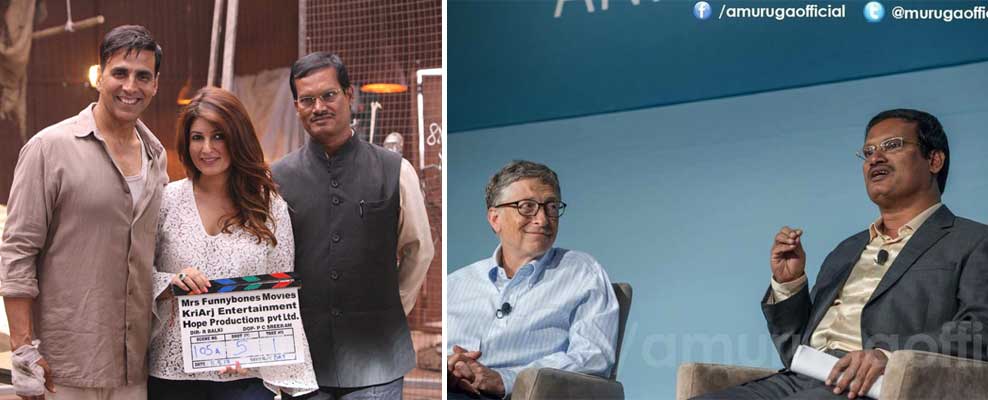“Pad Man”, played by Akshay Kumar in the recently released Hindi movie, is a tribute to Anunachalam Muruganantham. Muruganantham, against great odds, made sanitary napkins more affordable by inventing a low-cost mine-machine that manufactures sanitary napkins at a third of the commercial cost. These devices have been installed in 23 states. There are plans to expand the machine coverage to 106 countries.
Muruganantham, who developed the machinery to address what he understood as a burning social and women’s health problem, is also known for employing effective, low cost methods to generate awareness about unhygienic practices relating to menstruation.
His efforts attained worldwide fame. Time Magazine named him among the 100 Influential People in the World in 2014 and shortly thereafter he was awarded the Padma Shri in 2016. “Pad Man” closely follows Anunachalam’s life story, with poetic license of course, to raise attention to the pressing issue of the negative consequences of poor menstrual health management that impacts women’s health and status.

This is a refreshing story about a man dedicating his life to fight tradition and to improve women’s lives. Moreover, his effort to catalyze change started with the women in his own household who resisted him vehemently. Few of us, more privileged women stop to consider the scourge of those who must manage their menstrual health under challenging circumstances. Yet, millions of girls and women across India compromise their dignity and undermine their basic rights to manage their menstrual health.
“Pad Man” underlines the shame, discomfort, stigma, poor health and taboos that women experience from the time they first get their periods to open up the space for much needed public dialogue in India and many other parts of the developing world. It is most pressing in places of conflict, where girls and women experience harassment and even violence due to lack of safe spaces to manage their menstrual health.

Studies note that 71% of young girls in India have no access to information and knowledge about their menstrual cycle. Consequently, the first time they experience their periods they feel shock, fear, anxiety and guilt. Their mothers and relatives from whom they should ideally learn about menstruation and how to mange it, are not only ill-equipped and feel unable or unwilling to broach the topic. For the vast majority menstruation is still considered a “dirty” matter and discussed in terms of “a disease.”
In schools, too, teachers are not trained to teach about the subject. Increasingly, non-governmental organizations are stepping in and providing girls with the information they need to manage their menstrual health.
The lack of toilets and privacy in the majority of schools and at homes is a serious problem for menstrual health management. In 2012, 40% of all government schools lacked a functioning common toilet and another 40% did not have separate toilets for girls. Thus many girls miss school when they have their periods and some discontinue schooling when they start menstruating. At home, too, young girls and adolescents who do not have access to a private toilet must manage their periods outside their home, where they must search for secluded spaces, where they are often vulnerable to harassment and violence.
Whereas the government is addressing the importance of toilets the special needs of girls and women and the provisions that need to be made for them are largely unaddressed. There is barely any discussion of how menstrual waste can best be disposed of in the context of sanitation. Sanitary napkins are often thrown in the open, in water bodies and mixed with other waste. Improper disposal is the cause of drainage problems, clogging and manual cleaning of sewage.
The majority of girls and women who must still rely on old cloth, ash, rags, hay or sand as sanitary napkins are too expensive, risk infection. Poor hygiene-related practices during menstruation increase vulnerability to Reproductive Tract Infections (RTIs.) Use of sanitary napkins reduces the risk of cervical cancer and unhygienic practices can result in infertility.
Pad Man is a very timely film for this year Human Rights Watch declared: “the simple biological fact of menstruation shouldn’t be a barrier to gender equality or stymie women and girls’ realization of their human rights.” The right for girls and women to manage their menstruation hygienically and with dignity enables women and girls to enjoy their human rights that include the rights to education, health, and water and sanitation.
The film is scheduled to be released in 2750 screens in India and 600 screens overseas. With the assistance of several government departments it will play in smaller towns and cities. Hopefully it will engage audiences to catalyze awareness and outreach programs to empower girls and women in their everyday lives. Moreover it is an excellent starting point for discussing the critical related issues of reproductive rights and teenage pregnancy prevention, and the empowerment of women and girls.
